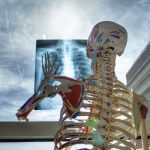What if you could know, with some certainty, when you’ll die? AI has the potential to make predictions that can optimise care and make end of life planning an easier process. While for the moment DEATH has got you covered with our Farewell Wishes tool, here’s a quick look at how machine learning, neural networks and the rise of data will transform end of life care.
Is it hard to predict when someone will die?
Dying isn’t always a smooth journey. Most deaths are unpredictable, and this fact is generally a strain on healthcare spending, let alone the person’s family. Even at the end of life, there’s no easy way of knowing whether someone has a good six months left in them, or a few weeks.
Enter AI. No, not the scary, killer-robot kind. But helpful modelling processes that can make a real difference in healthcare and predicting death.
What kind of AI can help doctors predict death?
We’re about to get technical, but stick with us. The kind of AI that will help doctors make predictions about when someone will die is called machine learning – the process of getting a computer to learn from the data it’s fed. Feed a computer enough data, it will start to recognise patterns on its own.
Machines learn faster than humans do, and that’s why there are always sensational newspaper headlines that read “Computers are replacing doctors!” But from robot assisted surgery to predictive diagnosis testing on healthcare apps, AI in the medical world isn’t new. You can read our post on the rise of robots in healthcare here. Now, this tech can benefit patients who want greater freedom in the choices they make at the end of life.
Can AI predict death better than doctors?
Google has declared that its AI model is better than doctors.The AI research team at Google has already developed a model that can predict the likelihood of a patient’s death, and even provide insights into how often some patients will need to be readmitted.
The AI is powered by machine learning that uses a ton of variables such as the patient’s medical history, age or hereditary information, and combines that with scribbled doctor’s notes, PDFs, and jottings on charts. Testing the model on over 200,000 and using over 46 billion data points, the final mode came up with an almost 95% accuracy when predicting patient outcomes.
How can AI help plan for death?
If an AI model can predict when you’ll die with a high probability, you might begin to think about what happens after.
Knowing when to start that conversation about end-of-life care can be difficult: families and doctors are sometimes eager to be optimistic about a patient’s chances, keeping morale high. This means a patient can miss the chance to make wishes clear.
A clear, accurate prediction of how long you have left using machine learning can cut through the chaotic planning, leaving the patient to get death in order with a sense of control.
How machine learning is used to help terminally ill patients
Here in the UK, the Imperial College NHS Trust has developed an algorithm that can detect ovarian cancer. Researchers say that this new technology could help clinicians administer the best treatments to patients more quickly. It also paves the way for more personalised medicine; the algorithm can also predict what treatment would be most effective.
This means the patient knows exactly what route their care will take – from the kinds of treatment they’ll need to endure to the likelihood of success. It gives space for someone to decide whether they want to go through with the treatment, and how best to cope with it.
Find out more
If you’re not looking for a death prediction, but you do want to get your death in order, complete your Farewell Wishes. In 5 questions and two minutes you’ll figure out how you’d like to be remembered.It’s not just AI that’s changing healthcare. Take a look at all the tech transforming how we get treatment in our post here.






